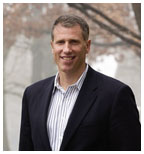Photo by Ricardo Barros |
Paul Raushenbush
Associate Dean of Religious Life Paul Raushenbush is the great-grandson of both Louis Brandeis, the first Jewish Supreme Court justice, and Walter Rauschenbusch, the early 20th-century Baptist pastor and professor who was a leader in the “Social Gospel” movement that worked to rectify economic and social injustice. Perhaps it’s little wonder, then, that he has found a niche at Princeton nurturing interfaith dialogue. Since arriving on campus in August 2003, Raushenbush, a Baptist minister, has shepherded the Religious Life Council (RLC), a group of 25 students from diverse religious traditions that meets weekly to discuss faith. Later this month the RLC will host the first national gathering of multifaith campus councils. Raushenbush is the author of Teen Spirit: One World, Many Paths, Your Guide to Spirituality and Religion (2004). He spoke with PAW’s Katherine Federici Greenwood.
How do the RLC and interfaith dialogue help students?
There’s a sense of sacredness. Because we treat each other with respect, students can be really honest about what they believe. We have something on the RLC we call “holy envy,” where we admire pieces of other people’s traditions. What that does is cause students to go deeper into their own traditions. That can’t be emphasized enough because some people think that this kind of work is just trying to meld all religions, and that it’s very fluffy. That’s absolutely not the case.
What other interfaith student groups meet on campus, and what is the goal?
A Muslim-Jewish dialogue group started last year. Another one, Rumi, a largely Muslim group, last semester held a campuswide Iftar dinner, which is when you break the fast in the evening during Ramadan. Rumi got people to sponsor students and staff who wanted to fast like a Muslim for a day and ended up raising $4,000 for the Trenton Area Soup Kitchen. There were about 250 people at the Iftar dinner. I was at a table with Muslims, Jews, and Hindus.
My hope is that this experience goes on to create leaders who will have a facility in dealing with people whose worldview is different from their own. My goal is that students at Princeton will have a fluency in talking about religion so that they are not timid in their workplaces to really address religious issues.
Take the Muslim-Jewish dialogue group, for example. Here you had the former president of the Muslim Students Association and the former president of the Center for Jewish Life, both of whom had grown up never having met a Jew or Muslim, respectively. They met each other at a study break and decided they needed to know one another. They started their group, agreeing not to talk about politics. Instead they talk about food and religious traditions. Now Muslims on this campus finally know someone who is Jewish, and Jews know someone who is Muslim. And that kind of understanding will change the way they will view the world as much as any class will, and it will change the way they operate in the world as much as any major will.
How did the legacy of Walter Rauschenbusch influence you and your family?
All of his children went on to do important things helping society. For example, my grandfather Paul Raushenbush and grandmother Elizabeth Brandeis were economists at the University of Wisconsin in Madison, and wrote the first unemployment-compensation bill in the nation. The idea of alleviating suffering — that we had a responsibility to help create a better America — was something that was very present in my house. After I graduated from Union Theological Seminary in New York, I counseled homeless kids in Seattle and then worked in a drug-rehabilitation center in Brazil. I also started an advice column called “Ask Pastor Paul” on Beliefnet.com, which is my way of reaching out to younger people who are struggling with faith or life issues.
You’ve spoken openly in sermons about your own struggle to overcome drug and alcohol abuse. How did you get hooked?
After college I spent several years in Spain, where I was a DJ and ran a record company. After I came back from Spain, I was living very much the rock-and-roll lifestyle. I was 25, drinking more than I wanted to and smoking more pot than I wanted to. Basically, I woke up one day and I said, “Enough.” Addictions are really hard to break, and I don’t think you can break them without God. I went to a hospital outside Boston for a month and spent eight months in a halfway house. I was an upper-middle-class kid around people really different from myself. It was a tough but really wonderful experience. It was a spiritual awakening.
How did that experience influence your life?
I have a great deal of sympathy for people who are having trouble. Because
there but for the grace of God go I. ![]()


